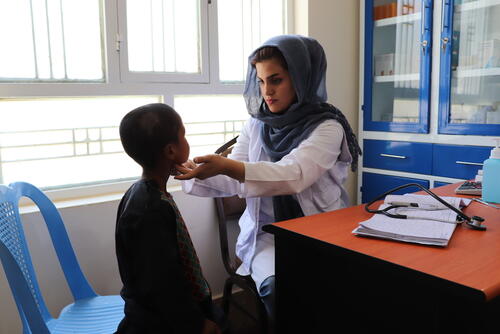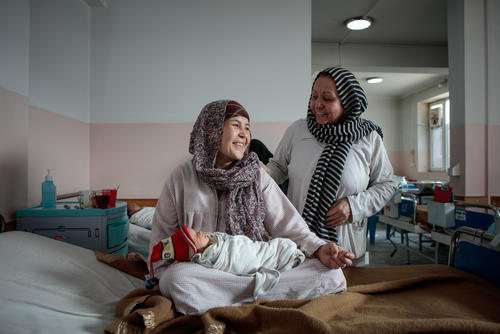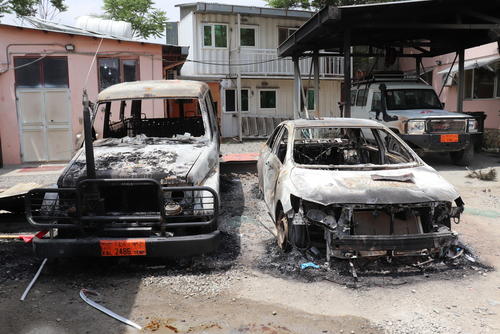Executive Summary
Over 40 years of conflict and instability have left Afghanistan’s economy and infrastructure in ruins and millions dependent on humanitarian assistance.According to the <a href="https://www.humanitarianresponse.info/en/operations/afghanistan/document/afghanistan-humanitarian-needs-overview-2020">Humanitarian Needs Overview for Afghanistan in 2020</a>, 9.38 million people are in need of humanitarian assistance, compared with 6.3 million in 2019. The international medical humanitarian organisation Médecins Sans Frontières (MSF) finds that Afghans today still struggle to get access to healthcare due to pervasive violence, widespread poverty, and a weak public health system. Morbidity and mortality rates remain high. This briefing paper features the stories of patients, their caretakers, and our staff in Herat and Helmand provinces to illustrate the many obstacles people face in their efforts to get medical care.
While international attention has recently focused on the potential impact of a peace agreement between the United States and the Islamic Emirate of Afghanistan (IEA, also known as the Taliban) and the anticipated resumption of intra-Afghan talks, it remains too early to know whether these developments will translate into meaningful peace on the ground. A sustained reduction in violence going forward would certainly provide much needed relief—as civilian deaths and injuries due to armed conflict almost doubled between 2009 and 2019, with a record high death toll in 2018.<a href="https://unama.unmissions.org/protection-of-civilians-reports">2019 Quarterly Report on the Protection of Civilians in Armed Conflict</a>, UNAMA, October 2019
It is important to understand that violence not only kills directly but also indirectly, through the disruption of access to healthcare. Active fighting and indiscriminate violence create a climate of fear among civilians and often contribute to delays seeking care. Staff at MSF-supported facilities in Afghanistan regularly witness the impact that such delays can have, sometimes making the difference between life and death. Women and children are particularly vulnerable.
Attacks on healthcare have continued unabated in recent years, forcing many hospitals to suspend vital medical services or shut down entirely. The result is that even more people are denied access to basic medical services. Armed conflict also obstructs vaccination campaigns, particularly for polio and measles.
Millions of people in Afghanistan are food insecure. In 2019, teams at Boost hospital in Lashkar Gah, Helmand, treated 3,997 children for severe acute malnutrition, one of the main causes of mortality in the province. Recurring natural disasters have exacerbated the impact of years of war. In 2018 a prolonged drought affected two-thirds of the country, destroying agricultural land and livestock. The drought was followed by flash floods in 2019, which added financial hardship for thousands of people who lost their homes and their livelihoods. Afghanistan is among the countries most vulnerable to the effects of climate change, including the increased risks of drought and flooding.<a href="https://www.af.undp.org/content/afghanistan/en/home/projects/CCAP-Afghanistan.html">Climate Change Adaptation Afghanistan</a>, UNDP
Widespread poverty also puts care out of reach for many Afghan people, as witnessed daily through the stories our patients tell us and in the cases that we treat. Patients describe delaying or avoiding care, or selling essential household goods in order to cover health-related expenses. While MSF provides health services free of charge, a growing number of medical facilities in the country have begun collecting user fees as part of a cost recovery approach, which makes care unaffordable for many.
As local, national and international stakeholders look ahead to build a more stable future for Afghanistan, they must acknowledge that the country’s humanitarian situation has not improved and, in some areas, has worsened in recent years. An urgent priority now must be to ensure greater access to free, high-quality healthcare and respond to the acute medical needs.
Summary of key findings
Based on MSF survey results from Herat regional hospital in Herat province and medical data collected at Boost hospital in Lashkar Gah, Helmand province. See Methodology section.
Herat regional hospital
- 41% of caretakers and patients surveyed stated that a family member, friend or neighbour had died in the past two years due to lack of access to medical care.
- Postponing medical care due to financial pressure is a dangerous coping strategy adopted by 89% of patients and caretakers surveyed; 43% stated they had postponed medical care more than three times over the past two years.
Boost hospital
- During the first six months of 2019, 44% of the children who died within 24 hours of arrival in the paediatric intensive care unit (PICU) had arrived too late and at a very advanced stage of illness.
- Of 3,680 measles cases treated in the first seven months of 2018, 48% were admitted to the isolation ward due to severe complications.






